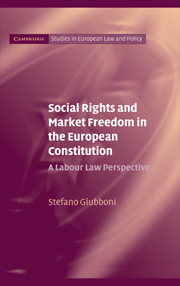Book contents
- Frontmatter
- Contents
- Series Editors' Preface
- Foreword by Professor Silvana Sciarra
- Acknowledgements
- Table of Cases
- Table of Legislation
- Introduction
- PART I Social policies and market principles. European social integration revisited
- PART II The market, competition and social rights in the European constitutional space
- 3 Infiltration of Community competition law into national systems of labour law, and its antidotes
- 4 Forms of regulation of social Europe and models of the European economic constitution
- Conclusions
- Index
3 - Infiltration of Community competition law into national systems of labour law, and its antidotes
Published online by Cambridge University Press: 28 July 2009
- Frontmatter
- Contents
- Series Editors' Preface
- Foreword by Professor Silvana Sciarra
- Acknowledgements
- Table of Cases
- Table of Legislation
- Introduction
- PART I Social policies and market principles. European social integration revisited
- PART II The market, competition and social rights in the European constitutional space
- 3 Infiltration of Community competition law into national systems of labour law, and its antidotes
- 4 Forms of regulation of social Europe and models of the European economic constitution
- Conclusions
- Index
Summary
Introduction
The word ‘infiltration’, like (and perhaps even more so than) all the others such as ‘intrusion’, ‘penetration’, ‘corrosion’ and ‘erosion’ that have also become part of the common phraseology used by labour lawyers over the past decade or so to describe the troubled relationship between Community competition and market law and national labour-law systems, immediately evokes the idea of a threat, an insidious danger which originates from outside but is capable of penetrating more or less secretly or subtly to the deepest roots of a system to the point of shaking its very foundations and putting its most solid and ‘internal’ categories in crisis. Consequently, it does not introduce a ‘neutral’ description of the phenomenon but carries within itself a specific and obviously negative evaluation. And although the sheer familiarity of this usage – felicitously initiated by Gérard Lyon-Caen and now become, in its several ‘variants’, almost commonplace – may have to some extent blunted the original negative connotation, it has not altogether lost its intrinsic evaluative, rather than merely descriptive, meaning and so still inevitably contains an unequivocal (dis)value-judgement.
When assessed in terms of the potential for radical and comprehensive effects that is inherent in its asserted function of making social rules conform to market requirements, the infiltration of competition law – as the extreme and purest, and as it were quasi-sublimated, expression of the ‘forced’ deregulation of employment relationships – would appear, in point of fact, to call directly into question the ‘very legitimacy of labour and social-security law’.
- Type
- Chapter
- Information
- Social Rights and Market Freedom in the European ConstitutionA Labour Law Perspective, pp. 153 - 231Publisher: Cambridge University PressPrint publication year: 2006



